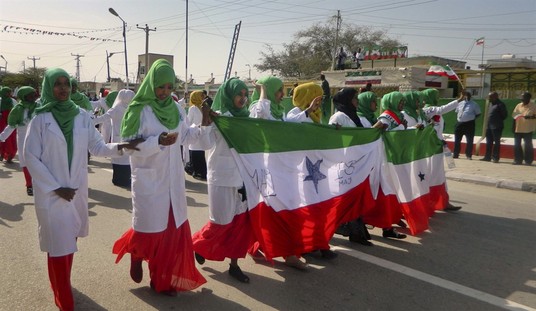“Why Obama Can’t Say ‘Radical Islam,'” as discussed by Eli Lake at Bloomberg News, who places BHO’s Orwellian euphemisms into context with the Mother of Them All, GWB original use of the phrase “War on Terror” after 9/11 instead of a war against radical Islamism. As Daniel Pipes noted as early as 2002, calling such an existential struggle a “War on Terror” is like calling World War I a War on Trenches or World War II a War on Submarines. But today, Lake writes:
Elliott Abrams, who served in senior National Security Council positions throughout the Bush administration, told me, “We were invading two Muslim countries and we were being accused of being at war with Islam. So the administration wanted to make it very clear that we are not at war with Islam and every Muslim in the world.”
All of this gets to a paradox of the war on terror. It has never been a war on the tactic of terrorism, and it has always been a war against networks of radical Islamists. But in order to wage that war, the U.S. has had to ally with Muslim countries and people, many of whom believe the state should punish apostates, adulterers and blasphemers.
Sadly, large pluralities of Muslims in countries allied with the U.S. in the war on terror disavow the tactics of terrorism but endorse the aims of radical Islam. For example, 74 percent of Muslims in Egypt feel that sharia should be the “country’s official legal code,” and an equal majority say it should apply to non-Muslims as well as Muslims, according to a 2013 Pew Survey. Three-quarters of Pakistani Muslims support laws banning blasphemy. A majority of Muslim Iraqis said they supported “honor killings” of women who engage in premarital sex or adultery.
Given these popular attitudes, even the governments in the Muslim world most actively aiding in the fight against al-Qaeda and the Islamic State have to tread a fine line over fundamentalist religion, and Washington doesn’t want to make that task harder.
At the Times of Israel though, Jeffrey Herf, the author of the brilliant 2006 book, The Jewish Enemy: Nazi Propaganda During World War II and the Holocaust, explores “Reframing the enemy after France’s 9/11:”
Today, it is a commonplace among historians of the Nazi regime that Hitler drew on a distorted and selective reading of the Christian tradition to justify his hatreds. Just as historians would not say that Christianity led to the Holocaust, so too we would not say that it had nothing to do with it at all. A very different understanding of Christianity inspired Winston Churchill and Franklin Roosevelt to fight against the Nazis. Yet however distorted the Nazis’ selective reading of Christianity was, accusations against the Jews were a part of its religious teachings for centuries. The Koran did not lead to 9/11, Al Qaeda, Hamas or the Paris murders, but neither does a selective reading of some of its passages by young, impressionable minds have “nothing to do” with them either. The same standards of critique and selective reading that have been applied to Christianity and Judaism should be applied to Islam, no more and no less. Until this past week, when French Prime Minister Manuel Valls spoke so frankly in Paris, it has been primarily Israeli leaders who have been willing to publicly state the obvious about the impact of Islamism on the terrorism of recent decades.
Now that Valls has stated clearly that France is, in fact, at war with radical Islam, with the terrorism and anti-Semitism it inspires, the contrast with the euphemisms and avoidance coming from the United States since 9/11 is apparent. Three million people have just bought the first post-massacre edition of Charlie Hebdo. The French National Assembly sang the Marseillaise for the first time since 1918. Valls has said that if 100,000 Jews leave France, the Republic would be judged to be a failure. The candid talk in France is coming from left-of-center politicians. These days in France remind me of autumn of 2001, when minds opened in the midst of mourning and anger. Yet within a year or two, a conventional wisdom and a refusal to speak frankly came to dominate American public discourse and continues to today. With the American experience after 9/11 in mind, one wonders how long Valls’ willingness to speak frankly about radical Islam will persist, or whether the conventional wisdom many decades in the making will lead again to new forms of euphemism and avoidance.
In his latest USA Today column, on “France’s demographic bad luck,” Glenn Reynolds slips a phrase from Robert Heinlein into his title and conclusion. Heinlein wrote:
Throughout history, poverty is the normal condition of man. Advances which permit this norm to be exceeded — here and there, now and then — are the work of an extremely small minority, frequently despised, often condemned, and almost always opposed by all right-thinking people. Whenever this tiny minority is kept from creating, or (as sometimes happens) is driven out of a society, the people then slip back into abject poverty.
This is known as “bad luck.”
This is France’s moment to determine whether their “spell of bad luck” is temporary or permanent. I’m hoping they choose wisely, but their past decisions don’t inspire much long-term confidence, alas.
* Of course, the modern-day EU has their own Orwellian euphemisms for World War II, but that’s a whole other post.
Update: Victor Davis Hanson on “Untrue Truisms In The War On Terror.”










Join the conversation as a VIP Member